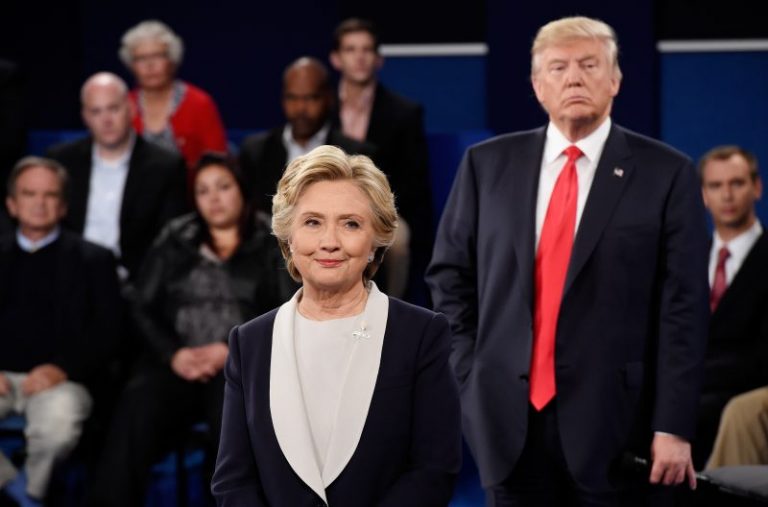Former president Donald Trump and his lawyer, Alina Habba, have been fined almost $1 million by a federal judge in Florida for what was ruled a frivolous lawsuit brought against his 2016 presidential rival Hillary Clinton and others.
Trump is a “prolific and sophisticated litigant who is repeatedly using the courts to seek revenge on political adversaries,” wrote U.S. District Judge Donald M. Middlebrooks in his searing 46-page judgment published late Thursday.
“He is the mastermind of strategic abuse of the judicial process, and he cannot be seen as a litigant blindly following the advice of a lawyer. He knew full well the impact of his actions,” said Middlebrooks. “As such, I find that sanctions should be imposed upon Mr. Trump and his lead counsel, Ms. Habba.”
Trump — who has announced his bid for the presidency in 2024 — Habba and the Habba Madaio & Associates law firm are jointly liable for $937,989.39, the court found.
The suit was filed in March 2022, with Trump alleging that Clinton and others had orchestrated “a malicious conspiracy” to spread false information that his campaign had colluded with Russia during the 2016 presidential race that he won.
It was dismissed in September by Judge Middlebrooks, who said there were “substantive defects” in the case and grievances for which a court was “not the appropriate forum.” Despite this, the judge said in his Thursday ruling that Trump’s attorney Habba had been “undeterred” after the case’s dismissal and continued to advance the claims, leading to the fine.
“Here, we are confronted with a lawsuit that should never have been filed, which was completely frivolous, both factually and legally, and which was brought in bad faith for an improper purpose,” Middlebrooks wrote, decrying what he called “abusive litigation tactics.”
In a blistering judgment he said the case was “intended for a political purpose” and showed a “continuing pattern of misuse of the courts by Mr. Trump and his lawyers,” undermining the rule of law and diverting resources. “No reasonable lawyer would have filed it,” he added.
Representatives for Trump and Habba did not immediately respond to an overnight request for comment from The Washington Post.
Along with former secretary of state Clinton, Judge Middlebrooks said 30 individuals and entities were “needlessly harmed” by the case in a bid to “advance a political narrative.” Among them were former FBI director James B. Comey, the Democratic National Committee and Christopher Steele, a former British spy hired by an opposition research firm working for the Clinton campaign who compiled a now-infamous dossier alleging ties between Trump and Russia.
Middlebrooks described the legal complaint as “a hodgepodge of disconnected, often immaterial events, followed by an implausible conclusion.” One example he cited was the alleged collusion between Comey and Clinton, a claim he said not only lacked substance, but was “categorically absurd” given the impact Comey’s announcements about the investigation into Clinton’s emails had on her 2016 campaign.
The judge also said Trump’s suit misrepresented the 2019 report by former special counsel Robert S. Mueller III by saying it had exonerated him. Mueller said only that his team had made no determination on “collusion” with the Russian government, and that it had not found sufficient evidence to charge any member of Trump’s campaign with criminal conspiracy.
“The Plaintiff consistently misrepresented and cherry-picked portions of public reports and filings to support a false factual narrative,” Thursday’s judgment found. “It happened too often to be accidental; its purpose was political, not legal.”
The September dismissal was a victory for Clinton, who in April had asked the judge to dismiss the case. David E. Kendall, an attorney for Clinton, issued a one-sentence statement at the time, noting “the court’s opinion meticulously and comprehensively devastates Trump’s allegations.”
Trump’s team had previously unsuccessfully filed a motion to dismiss Middlebrooks, who was appointed to the bench in 1997 by President Bill Clinton.
The judgment also referenced Trump’s other lawsuits, saying they demonstrated “a pattern of abuse of the courts.” Among them were legal complaints against Twitter, CNN, New York Attorney General Letitia James and the Pulitzer Prize board for a 2018 award given jointly to The Post and the New York Times for coverage of alleged Russian interference in the 2016 presidential election.
Azi Paybarah contributed to this report.

